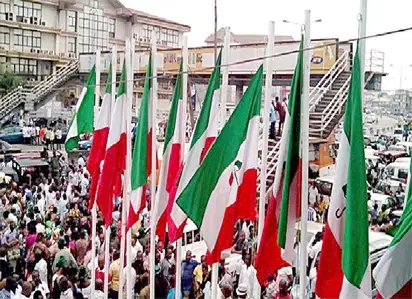In a dramatic legal showdown, seven opposition-led state governments have taken President Bola Tinubu to the Supreme Court, challenging his controversial suspension of Rivers State’s elected officials under a state of emergency.
TINUBU ACCUSED OF ILLEGAL POWER GRAB
The plaintiff states, through their Attorneys-General, argue that Tinubu has no constitutional right to suspend a sitting governor, deputy governor, or House of Assembly members.
They contend that his actions amount to an unlawful seizure of power, as nothing in the Nigerian Constitution permits the president to dissolve a democratically elected government.
At the heart of the lawsuit is a demand for the Supreme Court to declare Tinubu’s actions illegal and unconstitutional, as well as nullify the suspension of Rivers State Governor Siminalayi Fubara, his deputy, and state lawmakers.
SEVEN STATES STAND AGAINST FEDERAL INTERFERENCE
The plaintiff states include:
- Adamawa
- Bauchi
- Zamfara
- Plateau
- Bayelsa
- Enugu
- Osun
Each of Nigeria’s six geopolitical zones is represented in the lawsuit, signaling a nationwide resistance to presidential overreach. However, four PDP-controlled states—Oyo, Akwa Ibom, Delta, and Taraba—did not join the legal battle.
NATIONAL ASSEMBLY ALSO UNDER FIRE
The National Assembly is named as a co-defendant, as the plaintiffs argue that its approval of Tinubu’s emergency rule through a voice vote was unconstitutional.
They claim that Section 305 of the Nigerian Constitution requires a two-thirds majority vote for an emergency rule to be valid, making the approval process null and void.
SUPREME COURT PETITION: WHAT THE STATES WANT
The seven states are seeking:
- A Supreme Court order nullifying Tinubu’s emergency rule declaration in Rivers.
- An immediate reinstatement of Governor Fubara and other suspended officials.
- A ban on Tinubu from attempting similar suspensions in any other state, especially those controlled by the opposition.
HISTORIC LEGAL SHOWDOWN LOOMS
This case is poised to set a legal precedent, as the 1999 Constitution has never been tested in court regarding emergency rule suspensions.
While past administrations have used emergency powers, they have done so differently:
- Olusegun Obasanjo (2004 & 2006) removed elected officials in Plateau and Ekiti States.
- Goodluck Jonathan (2013) allowed governors to remain in office despite emergency rule in Adamawa, Borno, and Yobe.
The Supreme Court’s ruling will either validate Tinubu’s move or deal a massive legal blow to presidential overreach.
DO THE SEVEN STATES HAVE THE RIGHT TO SUE?
A major legal battle ahead will be whether these states have the “locus standi” (legal right) to challenge Tinubu’s emergency rule, since they are not directly affected.
If the Supreme Court rules in their favor, it could reshape how emergency powers are used in Nigeria forever. But if Tinubu prevails, it may set a dangerous precedent for federal intervention in state governance.
The battle for Rivers has begun, and its outcome could change Nigeria’s democracy forever.





